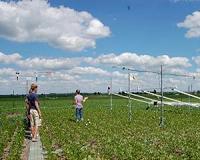 |
Hong Kong (AFP) July 9, 2010 Agricultural Bank of China's huge share sale this week underscores investor confidence that the country's so-called economic miracle is set to continue. But it also highlights what may be the lender's biggest challenge: to book ever-increasing profits while fulfilling its mandate to help bridge the yawning gap between urban and rural economic prosperity. AgBank -- on track to set a record, 22.1-billion-US-dollar initial public offering ahead of its dual Hong Kong-Shanghai listing this week -- was founded two years after Mao Zedong's 1949 communist revolution to lend money to China's poor farmers and distribute state money in rural areas. But heavy exposure to China's poverty-stricken interior meant its mission was frustrated by decades of chaotic policies, leaving the bank awash with bad debt and with a reputation as the weakest of China's major state lenders. AgBank, which has about 24,000 branches, mostly in China, and more than 320 million customers, has said it expects 2010 net profit to rise at least 28 percent year-on-year to 82.9 billion yuan (12.2 billion US dollars). Its bad debt ratio dropped from 4.32 percent in 2008 to 2.91 percent in 2009, although observers say that figure is far higher than its rivals, with the company earning more than a quarter of its revenue from rural banking. The return on capital from rural loans is typically 20-30 percent less than from urban loans, as the size of the rural loans is generally smaller and monitoring costs higher than urban ones. Spearheading government policy has also left AgBank poorly equipped to meet strict capital requirements, observers said. "It is generally considered the worst of the Big Four banks," Francis Lun, general manager of Hong Kong's Fulbright Securities, told AFP. "The only advantage is that there is lots of room to improve." In the past decade, Beijing began shoring up the state-owned bank's position with AgBank chairman Xiang Junbo vowing last month to pound its balance sheet into shape -- much like Industrial & Commercial Bank of China did after its record 21.9-billion-US-dollar listing in 2006. "There may be some slowdown in China's economic growth, but it won't be a hard landing," Jonathan Siu, an analyst at investment bank Core Pacific-Yamaichi in Hong Kong, told AFP. "And the banking sector should perform very well so there is potential for (AgBank) to have better earnings." AgBank's Hong Kong sale -- which drew almost a dozen heavyweight investors, including Qatar's sovereign investment fund, British bank Standard Chartered and Hong Kong's richest tycoon, Li Ka-shing -- came amid choppy markets weighed down by concerns about the global economy. The giant sale reflected a continuing shift in investor sentiment towards China's growth story, Royal Bank of Scotland said in a research note earlier. "European banks could only dream of raising this much capital at the moment," it said. AgBank's mandate to focus the core of its business on rural lending is not necessarily a disadvantage, Siu added. "There are lots of opportunities. The government wants to boost loans in rural areas and that is AgBank's focus," he said. AgBank's chairman echoed that sentiment, saying last month the company was poised to capitalise on Chinese government efforts to boost economic growth in the country's centre and west, which have missed out on the export-driven boom enjoyed by coastal regions. "The county area business will be one of our key profit drivers," Xiang said in June. "(AgBank) is well positioned to capitalise on China's next wave of growth." But Xiang last year said AgBank's mission would make convincing investors of its money-making potential a tough sell, and made his job "three times as busy" as his counterparts at rival banks. "Making money and fulfilling social responsibility is like balancing the co-existence of water and fire," he was quoted as saying by the Wall Street Journal in 2009. "A strong management system can serve as an iron pot to transmit the heat from the fire to boil the water." But the decades-old rural policy could fade into history after AgBank becomes a listed company with a new mandate to drive profits, Lun predicted. "I think (AgBank) will junk that policy and become more like a commercial bank."
Share This Article With Planet Earth
Related Links Farming Today - Suppliers and Technology
 'Business As Usual' Crop Development Won't Satisfy Future Demand
'Business As Usual' Crop Development Won't Satisfy Future DemandUrbana IL (SPX) Jul 09, 2010 Although global grain production must double by 2050 to address rising population and demand, new data from the University of Illinois suggests crop yields will suffer unless new approaches to adapt crop plants to climate change are adopted. Improved agronomic traits responsible for the remarkable increases in yield accomplished during the past 50 years have reached their ceiling for some ... read more |
|
| The content herein, unless otherwise known to be public domain, are Copyright 1995-2010 - SpaceDaily. AFP and UPI Wire Stories are copyright Agence France-Presse and United Press International. ESA Portal Reports are copyright European Space Agency. All NASA sourced material is public domain. Additional copyrights may apply in whole or part to other bona fide parties. Advertising does not imply endorsement,agreement or approval of any opinions, statements or information provided by SpaceDaily on any Web page published or hosted by SpaceDaily. Privacy Statement |